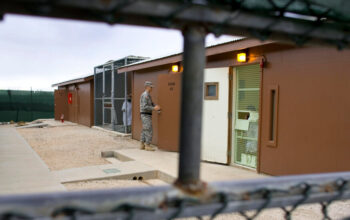
We’re covering a harsher line from the West on Russia and the reasons behind a decision to send Djokovic home.
The West scrambles for a unified response to Russia
With U.S. Secretary of State Antony Blinken scheduled to meet today with Russia’s foreign minister, Sergi Lavrov, in Geneva, President Biden strengthened his warning to Russia about a potential attack on Ukraine — a day after triggering alarm with his suggestion of divisions among European allies.
Biden had said that a “minor incursion” by Russia into Ukraine could mean “we end up having a fight” about the appropriate response. He spoke in starker terms on Thursday, saying that any Russian troop movement into Ukraine would be taken as an invasion and reiterating the threat of sanctions.
In public, top European and NATO officials were quick to play down questions of division. Others pointed out that the response depended on the circumstances and has always been divided.
Details: German leaders have stopped short of a commitment to halt a gas pipeline which may enrich Putin and increase his leverage. On Wednesday, French President Emmanuel Macron surprised and irritated E.U. colleagues by suggesting E.U. nations should come up with their own proposals.
Australian judges release reasoning for Djokovic
The three judges who oversaw the case against Novak Djokovic in Australia found that the immigration chief who revoked his visa was reasonable and rational, according to a ruling released on Thursday by the Federal Court of Australia.
The minister had argued that Djokovic’s position as a role model who chose to remain unvaccinated against Covid-19 could “foster anti-vaccination sentiment.”
In the first public statement of the court’s reasoning, the panel of judges concurred: “An iconic world tennis star may influence people of all ages, young or old, but perhaps especially the young and the impressionable, to emulate him,” they found. “This is not fanciful; it does not need evidence.”
It also noted the broad authority of the immigration minister, Alex Hawke, to control entry into the country. Hawke did not have to provide his reasons for canceling Djokovic’s visa, but the judgment said they were “carefully drafted.”
Recap: The court’s decision, which took the tennis star out of the Australian Open, concluded a volatile saga that prompted debate over immigration law and vaccinations. Djokovic had tried to enter the country under an exemption to the vaccination mandate for foreigners.
Here are the latest updates and maps of the pandemic.
In other developments:
Case dropped against M.I.T. scientist
U.S. prosecutors on Thursday dropped the government’s charges against Gang Chen, a professor of mechanical engineering at M.I.T. who had been accused of hiding his links to China.
Dr. Chen was arrested during President Trump’s last full week in office, and charged with a form of grant fraud. His arrest was part of the China Initiative, a government effort meant to stop scientists from passing sensitive technology to China. The Justice Department is reviewing that program.
Colleagues had rallied around him, saying that prosecutors had failed to distinguish between grant disclosure violations and more serious crimes like espionage or intellectual property theft.
Recently, officials at the Department of Energy told prosecutors that the department would have awarded the grant money to Dr. Chen even if he had disclosed the Chinese ties, calling into question the basis of the charges, according to people familiar with the matter.
THE LATEST NEWS
Asia Pacific
When the coronavirus pandemic brought travels to a halt, South Koreans started paying more attention to local booze. Makgeolli is a rice wine that was made by Koreans for centuries until postwar restrictions on grain alcohol nearly killed the craft. But it has grown in popularity over the past decade, and it exploded during Covid lockdowns among drinkers and home brewers alike.
ARTS AND IDEAS
A towering force in fashion
André Leon Talley’s approach to fashion could best be described as “more.” More glamour, more decadence, more delight. He evoked drama in both his personal style — wearing capes and furs — and his declarations. “It’s a famine of beauty, honey!” he once proclaimed. “My eyes are starving for beauty!”
Talley, who died this week at 73, was a pioneering figure in fashion. Using his encyclopedic knowledge of fashion history and his quick wit, he became an editor, author, adviser and TV personality. In the 1980s, he worked his way up to creative director at Vogue, and he spent decades there in various roles.
A 1994 New Yorker profile called Talley “The Only One” — a reference to him often being the sole high-powered Black editor in a field that is notoriously white. His influence is hard to overstate: He mentored the supermodel Naomi Campbell and helped dress Michelle Obama as first lady.
Growing up in the Jim Crow South, Talley wallpapered his bedroom with images ripped from Vogue. “I went to school and to church and I did what I was told and I didn’t talk much,” he told Vogue in 2018. “But I knew life was bigger than that. I wanted to meet Diana Vreeland and Andy Warhol and Naomi Sims and Pat Cleveland and Edie Sedgwick and Loulou de la Falaise. And I did. And I never looked back.”
In his own voice: Talley discussed his life on The Times’s “Book Review” podcast in 2020.
PLAY, WATCH, EAT
What to Cook

